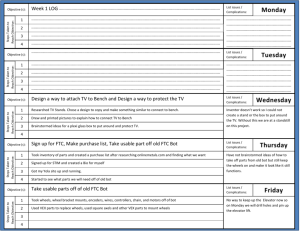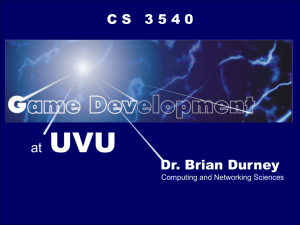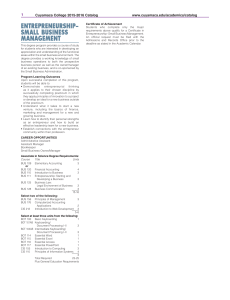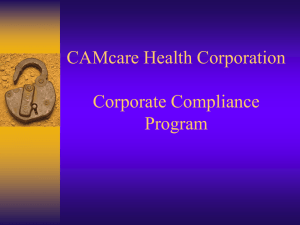BSc (Hons) Occupational Therapy - SC402 (Under Review)
advertisement
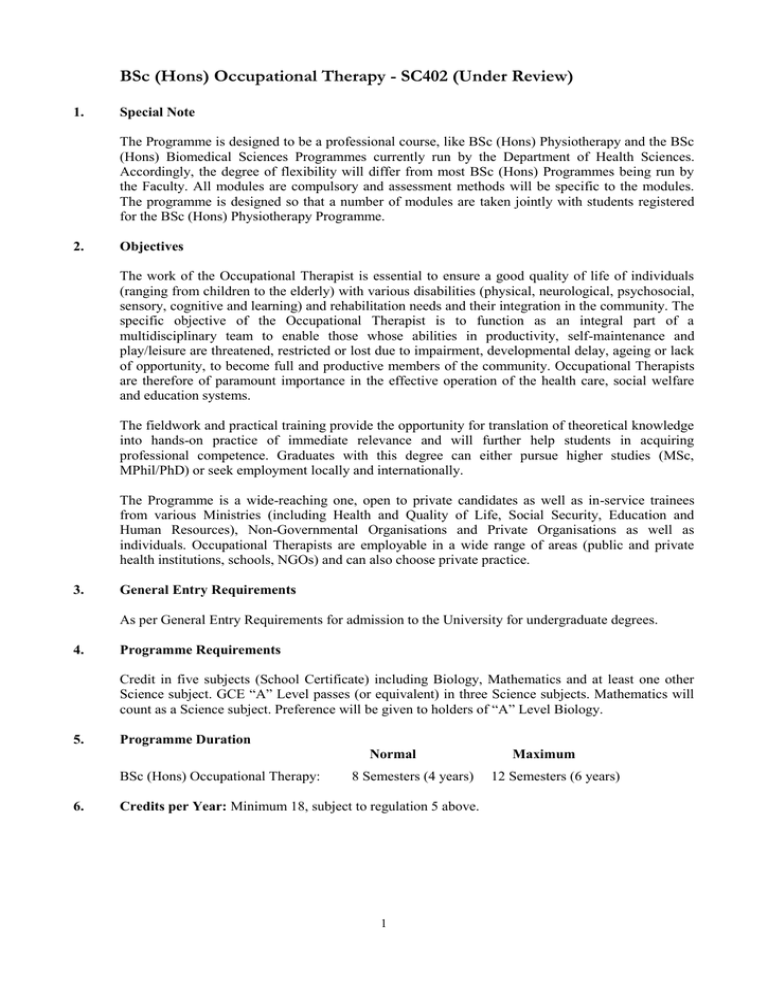
BSc (Hons) Occupational Therapy - SC402 (Under Review) 1. Special Note The Programme is designed to be a professional course, like BSc (Hons) Physiotherapy and the BSc (Hons) Biomedical Sciences Programmes currently run by the Department of Health Sciences. Accordingly, the degree of flexibility will differ from most BSc (Hons) Programmes being run by the Faculty. All modules are compulsory and assessment methods will be specific to the modules. The programme is designed so that a number of modules are taken jointly with students registered for the BSc (Hons) Physiotherapy Programme. 2. Objectives The work of the Occupational Therapist is essential to ensure a good quality of life of individuals (ranging from children to the elderly) with various disabilities (physical, neurological, psychosocial, sensory, cognitive and learning) and rehabilitation needs and their integration in the community. The specific objective of the Occupational Therapist is to function as an integral part of a multidisciplinary team to enable those whose abilities in productivity, self-maintenance and play/leisure are threatened, restricted or lost due to impairment, developmental delay, ageing or lack of opportunity, to become full and productive members of the community. Occupational Therapists are therefore of paramount importance in the effective operation of the health care, social welfare and education systems. The fieldwork and practical training provide the opportunity for translation of theoretical knowledge into hands-on practice of immediate relevance and will further help students in acquiring professional competence. Graduates with this degree can either pursue higher studies (MSc, MPhil/PhD) or seek employment locally and internationally. The Programme is a wide-reaching one, open to private candidates as well as in-service trainees from various Ministries (including Health and Quality of Life, Social Security, Education and Human Resources), Non-Governmental Organisations and Private Organisations as well as individuals. Occupational Therapists are employable in a wide range of areas (public and private health institutions, schools, NGOs) and can also choose private practice. 3. General Entry Requirements As per General Entry Requirements for admission to the University for undergraduate degrees. 4. Programme Requirements Credit in five subjects (School Certificate) including Biology, Mathematics and at least one other Science subject. GCE “A” Level passes (or equivalent) in three Science subjects. Mathematics will count as a Science subject. Preference will be given to holders of “A” Level Biology. 5. Programme Duration Normal BSc (Hons) Occupational Therapy: 6. 8 Semesters (4 years) Credits per Year: Minimum 18, subject to regulation 5 above. 1 Maximum 12 Semesters (6 years) 7. Specifications Professional Training in the form of fieldwork in MoH hospitals and other public/private institutions will form an essential part of the professional programme. Fieldwork will be undertaken during Professional Practice modules. Permission has been obtained from the Ministry of Health and Quality of Life for students to use existing facilities for practical work and fieldwork. Formal lectures will be scheduled over three days a week and another two days a week will serve for selfstudy and practicals/fieldwork. 8. Assessment Continuous and Written Assessment of Modules The pass mark will be 50% for all modules. Each module will carry 100 marks (i.e. expressed as %) and will be assessed yearly as follows: 8.1 Written exams Modules will be examined at the end of the year in which they are taught. The Foundation modules in year 1 carry no credits. The following modules will be assessed by a 2-hr written exam paper: Year 1 BOT 1112; HLS 1112; HLS 1122; HLS 1212; HLS 1221; HLS 1231; BMS 1121; HLS 1242. Year 2 BOT 2112; BOT 2121; BOT 2212; BOT 2222; BOT 2232; HLS 2112; HLS 2212. Year 3 BOT 3112; BOT 3122; HLS 3212. The following modules will be assessed by a joint 3-hr written exam paper: Year 2 HLS 2122 and HLS 2222. The following modules will be examined by a 3-hr written exam paper: Year 1 BOT 1011Y. Year 3 BOT 3011Y; BOT 3012Y. Year 4 BOT 4011Y 2 8.2 Professional Practice/Fieldwork Fieldwork is distributed throughout the curriculum. To ensure a depth of learning, fieldwork will be guided and workplace skills assessed by a learning contract (an agreement about the particular knowledge, skill, or attitudes the student will develop as well as the roles and responsibilities of the student) and supervised and assessed by an occupational therapist preferably with at least three years’ experience or an occupational therapy educator. The student has to demonstrate that s/he has achieved the learning specified in the learning contract in the form of a concise student-prepared log book and a supervisor’s report in the form of a structured questionnaire, summarising and rating the work training and experience based on a list of all therapeutic techniques used and skills acquired. Both log book and report will be signed by the immediate work supervisor. These will have to be submitted to the professional practice/fieldwork co-ordinator (to be identified) and to the UoM programme co-ordinator at the end of each relevant semester. Students will need to submit a satisfactory log book (Grade S) and obtain a satisfactory report (Grade S) in order to be awarded a Honours Degree in Occupational Therapy with professional standing. Unsatisfactory reports and unsatisfactory logbooks will be awarded Grade U. Professional Practice 1: students spend 2 mornings/week in a variety of settings during which Satisfactory Attendance is required. Professional Practice 2-7: students are progressively required to assess and treat patients and apart from Satisfactory Attendance they are assessed by a formal clinical exam at the end of each semester where the essential knowledge, skills and attitudes for competent practice will be assessed. In years 2, 3 and 4 the clinical exam will carry a weighting of 70% of the total marks for each of these modules with continuous assessment counting for the remaining 30% of the marks. 8.3 Practical work and Continuous Assessment for modules (except Professional Practice) Modules including a practical component There will be no practical exams. Practical work will be assessed on a continuous assessment basis and will carry a weighting of 50% of the total marks awarded for the respective modules involved. The pass mark for the continuous assessment of practical work will be 50%. Continuous assessment for the theory part of modules having a practical component may be in the form of assignments and should include at least one class test and will carry a weighting of 10% of total marks for the module. Modules not including a practical component Continuous assessment for modules not including a practical component may be in the form of assignments and should include at least one class test and will carry a weighting of up to 30% of total marks for the respective modules. 3 9. Grading Structure This will be as shown below taking into account that the pass mark for all modules is 50%. GRADE POINT AVERAGE (GPA) Under the GPA, the following letter grades and their grade point equivalent are used: Letter Grade A+ A AB+ B C F 10. Grade Point 4.00 3.00 2.00 0 Percentage Mark 90 ≤ x ≤ 100 80 ≤ x < 90 70 ≤ x < 80 65 ≤ x < 70 60 ≤ x < 65 50 ≤ x < 60 x < 50 Classification of Award The degree classification will be based on the CPA at the end of the Programme as follows: CPA (%) ≥ 70% 60 ≤ x < 70 50 ≤ x < 60 < 50 11. CLASSIFICATION 1st Class nd 2 Class 1st Division 2nd Class 2nd Division No Award with Honours Repeat and Termination of Registration If the CPA of a student is < 50 for an academic year, the student will have to repeat the entire academic year, and retake modules as and when offered. However, s/he will not be required, if s/he wishes, to retake module(s) for which Grade C or above has been obtained. Students will be allowed to repeat only once over the entire duration of the Programme of Studies. Registration will be terminated if the CPA of the student remains below 50 at the end of an academic year and the student has already repeated one year of study. A student’s registration will lapse at the end of the semester in which s/he has successfully completed the minimum requirements for the award of the degree. 12. Restrictions (a) A student who repeats a module must submit new assignment(s), take part in the class test and re-write the examinations. (b) A student will not be allowed to retake a module in which s/he has already achieved a C grade or above. (c) Students who fail in up to 2 modules, will be allowed to proceed to the following year if their CPA 50, and clearing the failed modules with the next cohort of students. However, students will not be allowed to take follow-up Professional Practice modules. Students who fail in more than 2 modules, will repeat the year. 4 13. Modules of Special Nature Audit Modules Students who wish to follow specific module(s) or are advised to do so by the Department may audit same. Such Audit modules are not examinable but will appear in their transcript subject to satisfactory attendance (Grade S). 14. Professional Training A minimum of one thousand hours are required as per WFOT, five hundred (500) of which must be full time in the field. In this programme, fieldwork is divided as follows: Professional Practice 1: Observation and Orientation: 90 hrs Assessment and treatment under direction (part time) in the modules of Occupational Therapy: Neurology, Neuro Musculo Skeletal/ Surgical/ Orthotics, Mental Health, Paediatrics and Cognition, and in the modules (i) Gerontology & Volition and Action, and (ii) Rehabilitation 180 hrs 15. Professional Practice 2 and 3 Professional Practice 4 and 5 Professional Practice 6 and 7 360 hrs 420 hrs 540 hrs Total Professional Training/Fieldwork: 1590 hrs List of Modules Code Module Name Hrs/Yr L/P Credits Foundation Course in Biology Foundation Course in Physics 60/30 60/30 - Health in Society 1 IT and Communication Skills for Health Sciences Introduction to Human Anatomy and Physiology Therapeutic Media Occupational Therapy (Foundations for Practice) 30/30 30/30 45/0 30/30 45/0 3 3 3 3 - Health in Society 2 Cardiovascular System Skeletal and Locomotor Systems Psychology for Health Professions Occupational Therapy (Foundations for Practice) Professional Practice 1 30/30 30/30 30/30 45/0 45/0 0/90 3 3 3 3 6 1 Year 1 (Optional Modules as per individual requirement) BMS 1011 BMS 1012 Semester 1 HLS 1112 HLS 1122 BMS 1121 BOT 1112 BOT 1011Y Semester 2 HLS 1212 HLS 1221 HLS 1231 HLS 1242 BOT 1011Y BOT 1222 5 Semester 3 HLS 2112 HLS 2122 BOT 2112 BOT 2121 BOT 2133 Health in Society 3 Nervous System 1 Psychiatry Gerontology & Volition and Action Professional Practice 2 30/30 45/0 45/0 35/20 0/180 3 3 3 3 3 Basic Pathology Nervous System 2 Occupational Science Occupational Therapy (Mental Health) Therapeutic Communication and Group Dynamics Professional Practice 3 45/0 45/0 45/0 35/20 30/30 0/180 3 3 3 3 3 3 Kinesiology Occupational Therapy (Neurology) Occupational Therapy (Neuro musculo skeletal/ Surgical/ Orthotics) Rehabilitation Professional Practice 4 40/10 35/20 35/20 3 3 - 35/20 0/210 3.5 Health Research Methods Occupational Therapy (Neuro musculo skeletal/ Surgical/ Orthotics) Rehabilitation Professional Practice 5 45/0 35/20 3 6 30/30 0/210 6 3.5 Research Project Occupational Therapy (Paediatrics and Cognition) Professional Practice 6 35/20 0/270 4.5 Research Project Occupational Therapy (Paediatrics and Cognition) Professional Practice 7 35/20 0/270 10 6 4.5 Semester 4 HLS 2212 HLS 2222 BOT 2212 BOT 2222 BOT 2232 BOT 2233 Semester 5 BOT 3112 BOT 3122 BOT 3011Y BOT 3012Y BOT 3113 Semester 6 HLS 3212 BOT 3011Y BOT 3012Y BOT 3213 Semester 7 BOT 4000 BOT 4011Y BOT 4112 Semester 8 BOT 4000 BOT 4011Y BOT 4212 6 13. Programme Plan - BSc (Hons) Occupational Therapy Semester 1 Semester 2 Code Module Name Code Module Name BMS 1011 or BMS 1012 HLS 1112 HLS 1122 Foundation Course in Biology or Foundation Course in Physics Health in Society 1 IT and Communication Skills for Health Sciences Introduction to Human Anatomy and Physiology Therapeutic Media Occupational Therapy (Foundations for Practice) BMS 1011 or BMS 1012 HLS 1212 HLS 1221 Foundation Course in Biology or Foundation Course in Physics Health in Society 2 Cardiovascular System HLS 1231 Skeletal and Locomotor Systems HLS 1242 BOT 1011Y Psychology for Health Professions Occupational Therapy (Foundations for Practice) Professional Practice 1 BMS 1121 BOT 1112 BOT 1011Y BOT 1222 Semester 3 Semester 4 Code Module Name HLS 2112 HLS 2122 BOT 2112 BOT 2121 Health in Society 3 HLS 2212 Nervous System 1 HLS 2222 Psychiatry BOT 2212 Gerontology & Volition and BOT 2222 Action Professional Practice 2 BOT 2233 BOT 2232 BOT 2133 Code Semester 5 Module Name BOT 3112 BOT 3122 Kinesiology Occupational Therapy (Neurology) Occupational Therapy (Neuro musculo skeletal/ Surgical/ Orthotics) Rehabilitation Professional Practice 4 BOT 3012Y BOT 3113 Basic Pathology Nervous System 2 Occupational Science Occupational Therapy (Mental Health) Professional Practice 3 Therapeutic Communication and Group Dynamics Semester 6 Code BOT 3011Y Module Name Semester 7 Code Module Name HLS 3212 Health Research Methods BOT 3011Y Occupational Therapy (Neuro musculo skeletal/ Surgical/ Orthotics) Rehabilitation Professional Practice 5 BOT 3012Y BOT 3213 Semester 8 Code Module Name Code Module Name BOT 4000 BOT 4011Y Research Project Occupational Therapy (Paediatrics and Cognition) Professional Practice 6 BOT 4000 BOT 4011Y Research Project Occupational Therapy (Paediatrics and Cognition) Professional Practice 7 BOT 4112 BOT 4212 7
